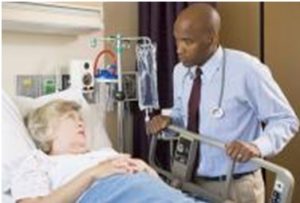The Nocebo effect is at least partially responsible for the pain and suffering experienced by millions of people. Words spoken by a doctor or a therapist can have profoundly negative impact on patient outcomes as they stick to them like Velcro.
“You have DDD, arthritis and wear & tear” or “Your spine is out of alignment” or “You just have to learn to live with this pain”, etc.
Patients even use Nocebo words on themselves when they say things like, “My body is a mess” or “I’m falling apart” or “My bad knee”, etc.
Googling can certainly further add to the Nocebo effect.
“…pain-related words activate brain networks similar to noxious stimulation. Importantly, chronic back pain patients show even stronger activation…”– Ritter et al 2016
The reason we are all susceptible to the Nocebo experience is because as humans, we are all influenced to varying degrees to negative words. The influence of negative words is however amplified if one feels their safety is threatened such as when experiencing pain.
“Experimental evidence indicates that negative verbal suggestions induce anticipatory anxiety about the impending pain increase, and this verbally-induced anxiety triggers the activation of cholecystokinin (CCK) which, in turn, facilitates pain transmission.” – Benedetti et al 2006
The good news is that the reverse is also true; hence we have the placebo effect where positive words and suggestions have potential positive effects on pain. (See my 3-min. video)

This study showed that that if patients in a hospital setting are not informed that they were being given opioids (hidden injections via IV), their pain relief was a third less than if they received the opioids with the injection in full view… truly fascinating!
Therefore the terms Placebo & Nocebo can be referred to as the “expectation effect” where any pain experience can be influenced by our expectation – sometimes for the better and sometimes for the worse.
There has been so many times where my patients whom I’ve known for many years and have built strong therapeutic alliance with have told me, “…just the fact that I knew I was going to come and see you today, I started to feel better”.
Perhaps they have associated seeing me with feelings of safety and a decrease in sense of danger and they associate me with always offering them hope :o).
As physiotherapists we are in a privileged position of providing care to people in pain; we therefore owe it to them to harness their positive expectations by reducing their anxiety. This is achieved by stopping the use of all anxiety-producing language.

